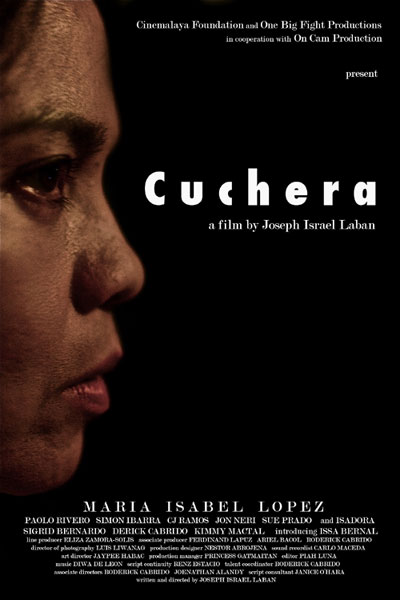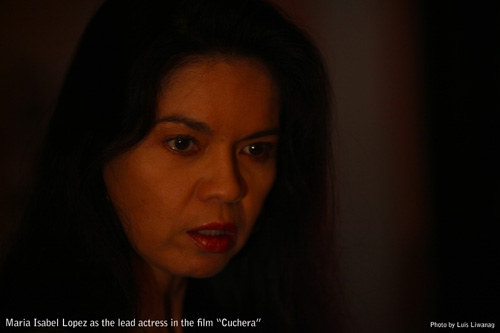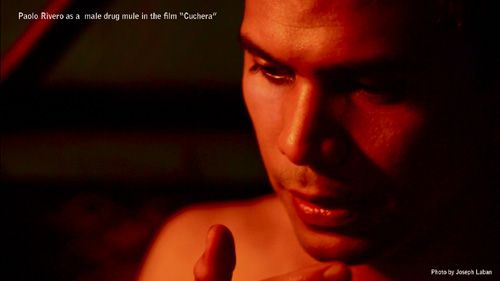Filtered By: Lifestyle
Lifestyle
Guilt and innocence are blurred in ‘Cuchera’
By IBARRA C. MATEO
Cuchera is much more than a gritty film that grimly tells of the tenacity and tragedy of Filipinos ensnared, both willingly and unwittingly, in the brutal world of international drug trafficking. With an almost documentary texture, Cuchera is an intelligent and a richly instructive film on how a subterranean network of syndicates uses the human body to transport illicit drugs. After watching the film twice, I left the theater on both occasions troubled by conflicting perceptions of the seemingly seamless divide between a criminal’s guilt and a victim’s innocence.  Are Filipinos who actively participate in the transport of illegal drugs by hiding them inside their internal organs, and wind up getting arrested in international airports, victims or criminals? There is no black-and-white answer, and Cuchera concentrates on the continuum of this equation. A Cinemalaya 2011 entry written and directed by multi-media journalist and creative writer Joseph Israel Laban, Cuchera successfully depicts the cruel stories of scores of Filipinos involved in the dicey world of illegal drugs. It is a nuanced narrative that tackles a distorted sense of innocence and certain guilt among the main players in a dangerous enterprise that calls for humans to act as so-called “mules" or carriers for illegal drugs syndicates. With a persuasive combination of a sociologist’s eye, the patience of an ethnographer, and a big heart concerned about the plight of a fellow Filipino, Laban -- through the characters in this film -- paints powerful portraits of hopes, despair, ambition, duplicity, and treachery among drug couriers, recruiters, and a host of accomplices. In an interview, Laban said Cuchera is based on the true story of a Filipina drug mule arrested by Chinese authorities when X-ray photographs showed dozens of heroin capsules inside her private parts and abdomen. “My intention in making Cuchera is to provoke a deeper national discussion on the plight of these Filipinos," he says. Among his documentaries for GMA News and Public Affairs, where Laban is a managing producer, is Kalbayo sa Kaharian which presents the experiences of “distressed" overseas Filipino workers in Riyadh and Jeddah, Saudi Arabia. Thus, it is no surprise that Laban exhibits empathy for the subject of his film.
Are Filipinos who actively participate in the transport of illegal drugs by hiding them inside their internal organs, and wind up getting arrested in international airports, victims or criminals? There is no black-and-white answer, and Cuchera concentrates on the continuum of this equation. A Cinemalaya 2011 entry written and directed by multi-media journalist and creative writer Joseph Israel Laban, Cuchera successfully depicts the cruel stories of scores of Filipinos involved in the dicey world of illegal drugs. It is a nuanced narrative that tackles a distorted sense of innocence and certain guilt among the main players in a dangerous enterprise that calls for humans to act as so-called “mules" or carriers for illegal drugs syndicates. With a persuasive combination of a sociologist’s eye, the patience of an ethnographer, and a big heart concerned about the plight of a fellow Filipino, Laban -- through the characters in this film -- paints powerful portraits of hopes, despair, ambition, duplicity, and treachery among drug couriers, recruiters, and a host of accomplices. In an interview, Laban said Cuchera is based on the true story of a Filipina drug mule arrested by Chinese authorities when X-ray photographs showed dozens of heroin capsules inside her private parts and abdomen. “My intention in making Cuchera is to provoke a deeper national discussion on the plight of these Filipinos," he says. Among his documentaries for GMA News and Public Affairs, where Laban is a managing producer, is Kalbayo sa Kaharian which presents the experiences of “distressed" overseas Filipino workers in Riyadh and Jeddah, Saudi Arabia. Thus, it is no surprise that Laban exhibits empathy for the subject of his film.  The Philippines reportedly tops the list of all Southeast Asian countries in the number of nationals arrested for drug smuggling charges in China. In 2009 alone, at least 95 Filipinos were in jail in China and various Chinese territories, with four of them on death row. The imprisoned Filipinos include minors who entered China with fake passports, according to the briefing materials for the film. Cuchera revolves around the story of Isabel, a veteran drug mule who is attempting to set up and run her own drug Manila-to-China transshipment operation. The lead character is played with understated force by Isabel Lopez, who is supported by Simon Ibarra as Samuel, CJ Ramos (Lobo), Paolo Rivero (Enzo), Jon Neri (Jonathan), Sue Prado (Lolita), Isadora (Rosa), and Kimmy Fajardo (Clarissa). Photojournalist Luis Liwanag is director of photography.
The Philippines reportedly tops the list of all Southeast Asian countries in the number of nationals arrested for drug smuggling charges in China. In 2009 alone, at least 95 Filipinos were in jail in China and various Chinese territories, with four of them on death row. The imprisoned Filipinos include minors who entered China with fake passports, according to the briefing materials for the film. Cuchera revolves around the story of Isabel, a veteran drug mule who is attempting to set up and run her own drug Manila-to-China transshipment operation. The lead character is played with understated force by Isabel Lopez, who is supported by Simon Ibarra as Samuel, CJ Ramos (Lobo), Paolo Rivero (Enzo), Jon Neri (Jonathan), Sue Prado (Lolita), Isadora (Rosa), and Kimmy Fajardo (Clarissa). Photojournalist Luis Liwanag is director of photography.  Many Cinemalaya 2011 viewers are hoping that Laban’s Cuchera will be blessed by the muses with the same good fortune they bestowed on Pepe Diokno’s Engkwentro, another debut film that was totally ignored by the Cinemalaya 2009 jury but collected prestigious international awards. Diokno simultaneously won the Luigi de Laurentiis Award for Debut Film and the Orizzonti Prize for Best Picture at the 66th Venice Film Festival. The film also won the Best Editing Award from the Gawad Urian in 2009 and the Network for the Promotion of Asian Cinema Prize for Best Asian Film during the 11th Jeonju International Film Festival in 2010. A warning to viewers: Cuchera is so explosively realistic that one feels transported into the room where the capsules of illegal drugs are inserted in various openings of the human body, hearing the anguished cries of the “mules" as they undergo preparation in transporting the contraband, and even tasting the slimy okra that is used to make the containers go down more easily. These “mules" stubbornly endure physical pain to survive these risky operations. And their guts, misplaced or otherwise, exhibit so well the harsh poetry of everyday life in the Philippines. – YA, GMA News
Many Cinemalaya 2011 viewers are hoping that Laban’s Cuchera will be blessed by the muses with the same good fortune they bestowed on Pepe Diokno’s Engkwentro, another debut film that was totally ignored by the Cinemalaya 2009 jury but collected prestigious international awards. Diokno simultaneously won the Luigi de Laurentiis Award for Debut Film and the Orizzonti Prize for Best Picture at the 66th Venice Film Festival. The film also won the Best Editing Award from the Gawad Urian in 2009 and the Network for the Promotion of Asian Cinema Prize for Best Asian Film during the 11th Jeonju International Film Festival in 2010. A warning to viewers: Cuchera is so explosively realistic that one feels transported into the room where the capsules of illegal drugs are inserted in various openings of the human body, hearing the anguished cries of the “mules" as they undergo preparation in transporting the contraband, and even tasting the slimy okra that is used to make the containers go down more easily. These “mules" stubbornly endure physical pain to survive these risky operations. And their guts, misplaced or otherwise, exhibit so well the harsh poetry of everyday life in the Philippines. – YA, GMA News

 The Philippines reportedly tops the list of all Southeast Asian countries in the number of nationals arrested for drug smuggling charges in China. In 2009 alone, at least 95 Filipinos were in jail in China and various Chinese territories, with four of them on death row. The imprisoned Filipinos include minors who entered China with fake passports, according to the briefing materials for the film. Cuchera revolves around the story of Isabel, a veteran drug mule who is attempting to set up and run her own drug Manila-to-China transshipment operation. The lead character is played with understated force by Isabel Lopez, who is supported by Simon Ibarra as Samuel, CJ Ramos (Lobo), Paolo Rivero (Enzo), Jon Neri (Jonathan), Sue Prado (Lolita), Isadora (Rosa), and Kimmy Fajardo (Clarissa). Photojournalist Luis Liwanag is director of photography.
The Philippines reportedly tops the list of all Southeast Asian countries in the number of nationals arrested for drug smuggling charges in China. In 2009 alone, at least 95 Filipinos were in jail in China and various Chinese territories, with four of them on death row. The imprisoned Filipinos include minors who entered China with fake passports, according to the briefing materials for the film. Cuchera revolves around the story of Isabel, a veteran drug mule who is attempting to set up and run her own drug Manila-to-China transshipment operation. The lead character is played with understated force by Isabel Lopez, who is supported by Simon Ibarra as Samuel, CJ Ramos (Lobo), Paolo Rivero (Enzo), Jon Neri (Jonathan), Sue Prado (Lolita), Isadora (Rosa), and Kimmy Fajardo (Clarissa). Photojournalist Luis Liwanag is director of photography.  Many Cinemalaya 2011 viewers are hoping that Laban’s Cuchera will be blessed by the muses with the same good fortune they bestowed on Pepe Diokno’s Engkwentro, another debut film that was totally ignored by the Cinemalaya 2009 jury but collected prestigious international awards. Diokno simultaneously won the Luigi de Laurentiis Award for Debut Film and the Orizzonti Prize for Best Picture at the 66th Venice Film Festival. The film also won the Best Editing Award from the Gawad Urian in 2009 and the Network for the Promotion of Asian Cinema Prize for Best Asian Film during the 11th Jeonju International Film Festival in 2010. A warning to viewers: Cuchera is so explosively realistic that one feels transported into the room where the capsules of illegal drugs are inserted in various openings of the human body, hearing the anguished cries of the “mules" as they undergo preparation in transporting the contraband, and even tasting the slimy okra that is used to make the containers go down more easily. These “mules" stubbornly endure physical pain to survive these risky operations. And their guts, misplaced or otherwise, exhibit so well the harsh poetry of everyday life in the Philippines. – YA, GMA News
Many Cinemalaya 2011 viewers are hoping that Laban’s Cuchera will be blessed by the muses with the same good fortune they bestowed on Pepe Diokno’s Engkwentro, another debut film that was totally ignored by the Cinemalaya 2009 jury but collected prestigious international awards. Diokno simultaneously won the Luigi de Laurentiis Award for Debut Film and the Orizzonti Prize for Best Picture at the 66th Venice Film Festival. The film also won the Best Editing Award from the Gawad Urian in 2009 and the Network for the Promotion of Asian Cinema Prize for Best Asian Film during the 11th Jeonju International Film Festival in 2010. A warning to viewers: Cuchera is so explosively realistic that one feels transported into the room where the capsules of illegal drugs are inserted in various openings of the human body, hearing the anguished cries of the “mules" as they undergo preparation in transporting the contraband, and even tasting the slimy okra that is used to make the containers go down more easily. These “mules" stubbornly endure physical pain to survive these risky operations. And their guts, misplaced or otherwise, exhibit so well the harsh poetry of everyday life in the Philippines. – YA, GMA News More Videos
Most Popular




